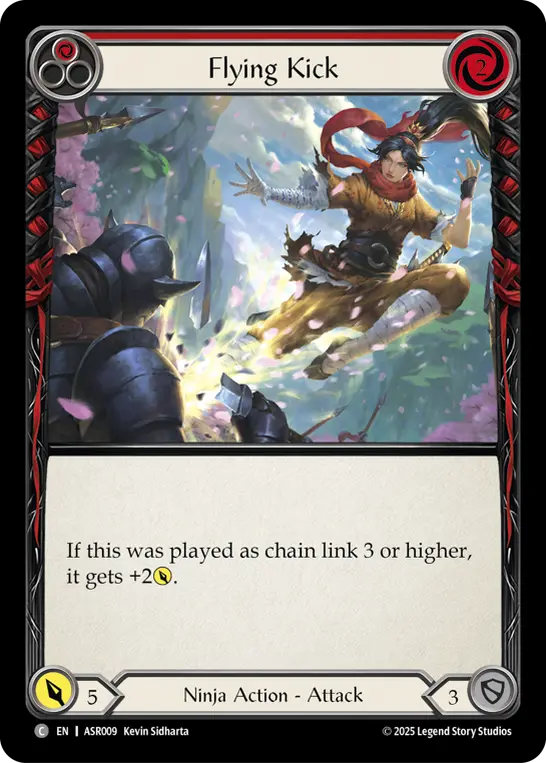Recently, I've been playing a lot more Blitz and taking it a lot more seriously. I'm definitely late to the party on that front, but there's a reason for the phrase 'fashionably late'. When you arrive at a scene that's already established, you can see dynamics that have formed and evaluate where you want to be, rather than where you ended up.
In this case, my late arrival on the Blitz scene has allowed me to look at a post-experimental landscape, relying on the findings of the community to avoid wasting my time on decks and strategies doomed to failure.
Yup, I could do that.
I totally didn't do that.
Instead, I took a hard look at the heroes deemed 'inferior' and asked: what were they doing wrong? And how could I do better? The answer, in turned out, was often the same.
The Benji Trap
Benji was the third Ninja in as many sets- Ninja being the first class to offer as many heroes. He brought with him a signature weapon (the Zephyr Needle- again giving Ninja more options in the CRU meta than any other class) and a promising ability: attack action cards with 2 or less damage can't be defended from hand. AKA: throw 10 weak attacks and win.


In theory, this seems super easy. After all, Ninjas are primed for go-wide strategies and death by a thousand cuts. You could completely ignore self-defense and consistently win on turn 3, or turn 2 with a Mask of Momentum, right?
Unfortunately, Benji gets a little overeager and shoots that strategy in the foot with the second half of his text: after your first attack action card hits, your next attack gets +1.
This leaves a vulnerable link in your chain, and in the worst possible place. Your only hope is peppering your deck with 1 damage attacks and hoping you draw into precisely one of them, to use it as the 2nd attack. Now Benji is draw dependent; your 'sure thing' isn't so sure anymore.
A Benji deck full of twos didn't work.
Kayo, D.O.A.
Did anyone fail to see the holes in Kayo's plan? He has 2:3 odds of failure! Take that critical examination a step further, and you'll note that failure, in this case, means taking an attack you paid a lot for and reducing it to that game-defining value of 3- easily blocked with a single card.
Kayo felt like a hero for Timmy: a player who liked his cards big and raw and risky. That one-in-three chance of doubling the damage on your already-large Brute attacks was too enticing to ignore, but surely this was just a fun, casual deck, right? There couldn't be competitive prospects built around a dice roll.


The real trouble comes when you put that prospective Oops, All Sixes deck on the table. The 66% of turns ruined by a bad roll aren't counterbalanced by the 33% of good rolls, because even a 12 can be blocked out with a full hand, and all you got out of it was a turn reset. You can't simply lean into sixes and let RNGesus take the wheel.
The Common Denominator
What do these heroes have in common? Beyond being exclusively Young heroes with mainstream alternatives in the same class, they both have Hero abilities that pull your attention toward their unique payoffs- and away from a competent and well-built deck.
This observation was sparked, in part, by a video from Joey Senart, who recently took to a critical examination of Azalea and theorized that, perhaps, we've been focusing too much on "Arrow" and "Dominate" in her ability, and not enough on "top card of your deck".
I think that, [between Azalea and Death Dealer], what is actually happening is that we're getting access to the top card of the deck. -Joey Senart
In order to move beyond the initial misunderstanding of heroes like Kayo and Benji, we simply need to look at why they failed.



Kayo fails because an occasional, unreliable 12 is not an equal exchange for ill-timed and overpriced 3s. There's no reason to run Kayo if you're not going to throw some haymakers, but they can't all be haymakers. If you were ever looking at the Brute card pool and wondering why anything under 6 even exists, it's so Kayo can play something and know how much damage he's threatening.
In turn, this means Kayo can build a better resource curve and not struggle as much to pay for everything. And it also means we should avoid the Brute discard costs as much as we can- we have nothing to gain from those discards.
But we still want sixes, for sure. And when we throw that dice, we want to potential payoff to be as substantial and as devastating as possible. How do we do that?
With Dominate.


The rest of the deck is truly 'season to taste'. Put some buffs in there, some decent 4-5 damage attacks, maybe even some Go Again if you want to try going wide. Or rely on your weapon while blocking out in classic fatigue Rhinar style. It only takes 2 or 3 big Dominates from Kayo to end a game in Blitz. Make sure you aren't losing ground between them, and you should do fine.
And as for our Ninja, the namesake of this condition? Take a page from Ira's playbook and milk that +1 for all it's worth. Benji can make great use of Zephyr Needle, especially as a follow-up to Brandish. That's an unblockable 2 into a 4 for only 2 resources. From there, go wherever the wind may take you.


Additionally, it's worth noting that because Benji is using the weaker versions of many attacks, he's actually exceptionally good at paying for things. That 2 cost in the example above probably costs him 1 card, and from there he can play out the rest of his hand.
Benji has no trouble throwing a Razor Reflex onto that Needle, pushing you past that tenuous 2nd hit and into a guaranteed Mask trigger. And he can easily afford Unmovable, helping sustain him long enough for chip damage to wear down the opponent. (That's an unintuitive approach to someone who only needs to hit 10 times to win, but trust me.)


Speaking of unintuitive approaches, there's no reason to cripple Benji's potential damage output just so it's unblockable! If you never strip cards from your opponent's hand, you risk their coming back at you harder than you came at them- which, honestly, is almost guaranteed when your attacks are limited to 2 damage.
Instead, look at the things your deck leans toward incidentally, and find cards that gain advantage from that. If your little Go Again attacks can't be blocked, you're likely to have a number of hits in one chain; why not end with Flying Kick? Using small cards anyway? Belittle gives you a free card for a free stat buff!
Then there are the situational, transformational cards. Salt the Wound can play as an unblockable 2 or a large finisher after a chain of other unblockable attacks. Adrenaline Rush, likewise, can be played as a 2 or a 5, depending on your life total.


Read Between the Lines
The best way to build a deck isn't always obvious, but characters like Benji take that a step further, actively drawing your attention away from the right answers. Sometimes you need to read between the lines to unlock the potential of a hero. The next time you get frustrated with a hero not living up to your expectations, take a step back and ask yourself, "Have I fallen into a Benji Trap?"




